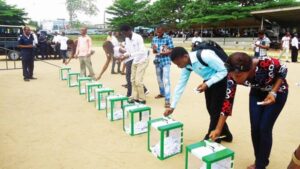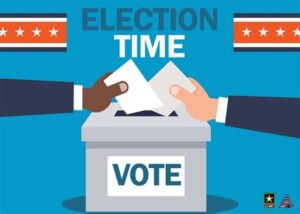Back to: Religion and National Value JSS2
Welcome to class!
In today’s class, we’re going to be talking about elections and voters. I trust you will enjoy the class!
Election and Voter
An election is a formal group decision-making process by which people choose an individual to hold public office. It is a way for the citizens of a country to choose their leaders and voice their opinions on how they will be governed.
The Importance of Elections

– Voice of the People: Elections enable citizens to express their will.
– Change of Leadership: They allow for the peaceful transition of power.
– Accountability: Elected officials are accountable to the people.
Who is a Voter?
A voter is anyone who has the right to vote in an election. In most countries, voters are citizens who have reached a certain age, usually 18 years.
Qualities of a Good Voter
![]()
– Informed: Understands the issues and candidates.
– Active: Participates in the election process.
– Responsible: Take the act of voting seriously.
The Voting Process
- Registration: Before you can vote, you must register.
- Casting a Vote: On election day, you go to a polling station and cast your vote.
- Counting Votes: After the polls close, votes are counted.
- Announcing Results: The winner is announced once all votes are counted.
Types of Elections

– General Elections: Determine national or regional leaders.
– Local Elections: Choose local government officials.
– Referendums: Allow voters to decide on a specific legislative issue.
The Role of Religion and National Values in Elections
– Religion: Teaches moral values that can guide voting decisions.
– National Values: Such as justice, equality, and freedom, are upheld through fair elections.
Challenges in Elections
– Voter Apathy: When people don’t vote because they feel their vote doesn’t matter.
– Election Fraud: When the election process is tampered with.
– Disenfranchisement: When certain groups are denied the right to vote.
How to Be an Informed Voter

– Research: Learn about the candidates and issues.
– Discuss: Talk with family and friends about the election.
– Debate: Participate in or watch debates to hear different viewpoints.
Examples from Around the World
– India: The world’s largest democracy with over 900 million eligible voters.
– United States: Known for its presidential elections every four years.
– Nigeria: Uses biometric systems to prevent election fraud.
Your Role as a Future Voter
As students, you may not be able to vote yet, but you can still be involved by:
– Learning: Educate yourself about the political process.
– Observing: Watch elections and learn how they work.
– Discussing: Engage in conversations about national values and how they relate to elections.
